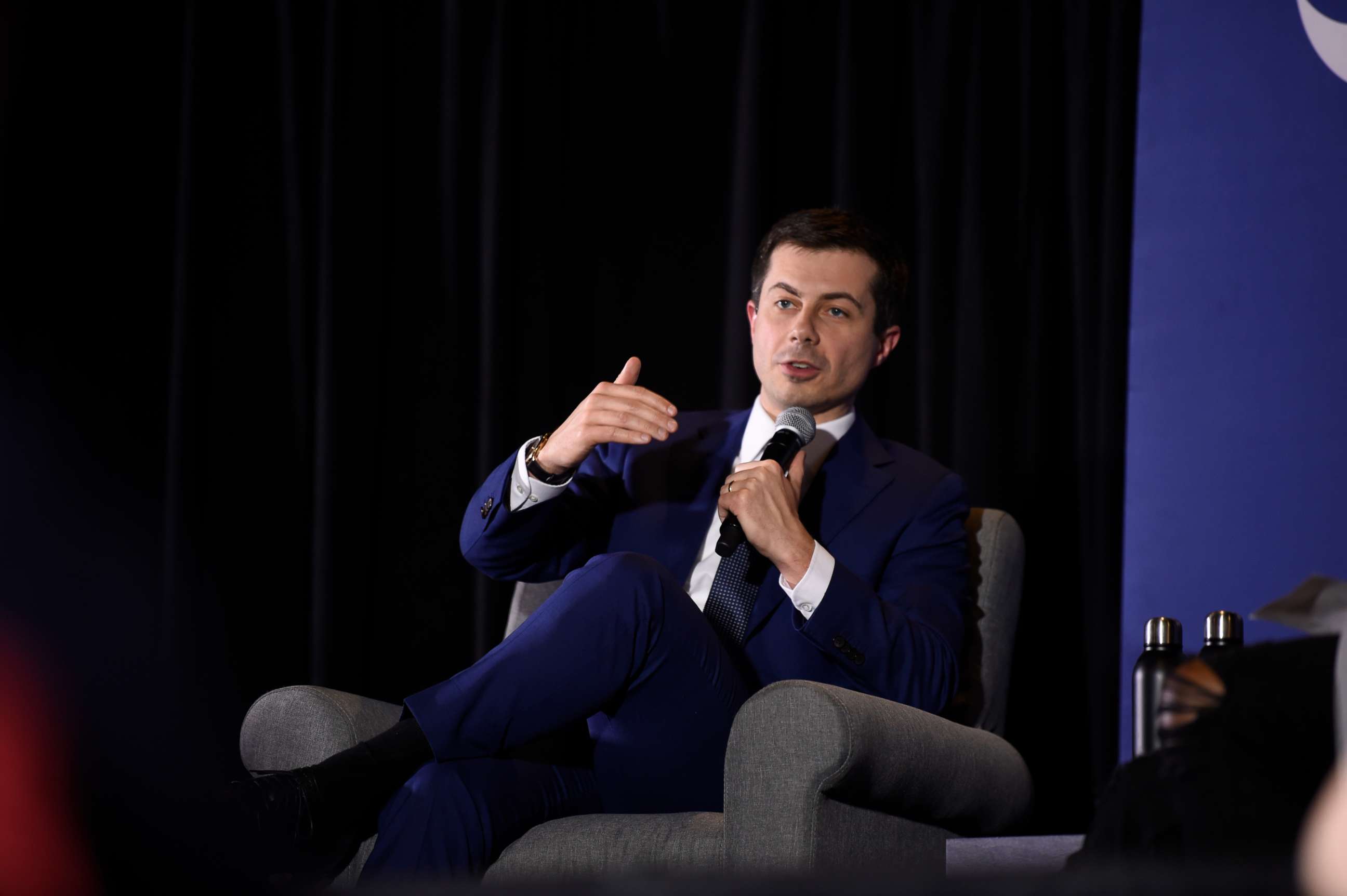Buttigieg gets candid with Charlamagne Tha God on black economics
The 2020 hopeful discusses the challenges in closing the racial wealth gap.
Charlamagne Tha God sat down with Democratic presidential candidate Pete Buttigieg in his hometown of Monks Corner, South Carolina, for a conversation about the 2020 hopeful's economic agenda for African Americans.
The radio and TV personality held no punches, asking frank questions about the former South Bend, Indiana, mayor's record on closing the racial wealth gap in his own city while teething though the details of his Douglas Plan, which supports black entrepreneurship, funds HBCUs and invests in black-owned businesses with federal dollars.
“I think the biggest lesson about the last 50 years, when it comes to racial inequality among the well-intentioned, is that you can't just take out a racist policy and replace it with a neutral one and expect everything to get better on its own,” Buttigieg said in front of a diverse crowd Thursday night of approximately 100 people, according to a campaign headcount.
The southern crowd appeared to be impressed with the mayor's knowledge of nuanced social issues impacting the black community, particularly in regards to healthcare disparities in southern states where the local government has refused to expand Medicaid benefits.
“We've got to deal with these health equity gaps, like the fact that a black woman is three times as likely to die related to childbirth as a white woman, or that diabetes and cancer mortality and detection are worse for black men," Buttigieg said.
Charlamagne asked the rising 2020 candidate about his plans to address the wealth gap for college-educated black Americans, who earn the same degree as white Americans but still earn less money. The mayor used the question to bring up inherited wealth and his 21st Century Homestead Act.
“When black homeownership is at its lowest level since almost the time of the Fair Housing Act coming into the first place, what we are seeing is that - that way of building wealth has been excluded generationally, and it never comes back without intention," Buttigieg said. "That's why I've proposed the 21st century Homestead Act, and we're very careful about calling it the 21st Century Homestead Act as the original Homestead Act, largely excluded black Americans, and it was at the expense of Native Americans.”
During a discussion about creating equal opportunity for entrepreneurs of color, Buttigieg explained why the city of South Bend only issued contracts to 3% of minority and women-owned businesses, citing that there was no way to measure where contracts were going before he created an Office of Diversity Inclusion, which allowed him to build the database necessary to make changes as the mayor.
While sharing the lessons he learned about incentivizing black-owned businesses, Charlamagne asked why it seems like politicians only want to learn about these things when they’re running for president.
“One thing that I think is really important, especially for Democratic-elected officials to understand right now, is that a lot of black folks have gotten the feeling that Democrats running for president take black folks for granted,” Buttigieg replied. Charlamagne asked the predominately black audience if they felt that way and there was a resounding “yes” and head nodding across the room.

When asked if he trusts his political party, specifically the DNC, Buttigieg reminded Charlamagne that he previously ran for the DNC chair and said Tom Perez and his team are doing “very good work.”
“We got to remember the party is us, right? The party isn't just the folks in the staff and the DNC. This is the party,” Buttigieg said and continued to push for party unity with the ultimate nominee.
“Right now, it's a heated competition. Everybody's for their candidates and exposing one another's flaws. And that's how competition works. But, let me say this, as somebody, who of course hopes the nominee will be me, 25 people who run for president, the moment we identify the one who's going to be the nominee, the 24 who didn't, and all of their supporters need to rally around the one who does,” he continued, receiving an approving response from the audience.
Before meeting with Charlamagne, Buttigieg sat down with Angela Rye at Claflin University for her Podcast, "On One," where he was honest about his struggle to energize black voters around his campaign. Nationally, he hovers around 2% among black voters, according to a recent Washingon Post/ Ipsos poll.
“I'll be honest, it’s mostly white folks showing up ... I'm happy for the folks who are showing up, but in order not just to win to deserve to win. I got to be speaking to everyone,” Buttigieg said.
“The simple fact is I have to earn [support from black voters],” he told Rye.
The event wrapped with a blunt and final question from Charlamagne: “How do we know you aren’t just blowing smoke up the black community’s a** to get our support?”
“I didn't get into running for office in order to comfort the comfortable. I walked away from a pretty good paying job in business, in order to make myself useful back home. And that means making yourself useful to everybody who has reason to doubt whether governments working for them," Buttigieg said.
He asked voters to take a chance on him and there’s good news for them if he doesn’t live up to their expectations.
“I only get a four-year trial period. And then if I'm not doing the job, y'all can fire me.”



